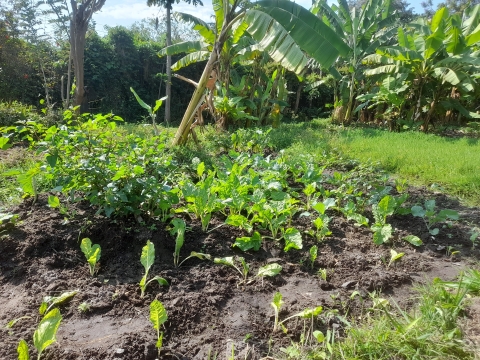
I have only been truly unemployed once in my career. I look back on the eight months I was ‘between jobs’ with gratefulness now, though at the time with a young family it was certainly stressful. In this ‘fallow’ time of my life, seeds of genuine humility were planted that continue to shape me today. Where I had lived and worked in Tanzania for a number of years under the assumption that I had much to lend the society, without a job I was forced to admit that I had little to actually set me apart from the many Tanzanian educated professionals also looking for work. It did not much matter that I had a degree from a top university in America, had ‘volunteered’ years of my life teaching math, spoke Swahili well, or that I had previously managed the construction of a large school. I had to face the fact that I was unemployed in a country of many more unemployed. I also had to come to grips with who I was, as a human being, opposed to the life experience I knew better, as a human ‘doing.’
Thinking of humility as an asset, or even a skill, seems a strange concept in U.S. culture. And yet, humility, patience, understanding, kindness, the fruits and gifts of the Holy Spirit—are all just the type of harvest referred to in the readings today. When Paul wrote in his letter to the Romans, “creation was made subject to futility,” he acknowledged that we humans are weak. We are in fact meant to be weak, so that we seek our creator. I have learned much about my relationship with God through my relationship with my wife of sixteen years. While I struggled to find gainful employment for those months in 2011, my wife supported us and stuck by my side. Especially in a male-dominated society, this was likely as humbling for her as it was for me. The experience strengthened our marriage in ways that nothing else would have.
If you have ever tried to grow something, you can certainly appreciate both the miracle of the experience and the effort it demands. While there is a certain magic to a seed growing into a plant that hopefully flowers and fruits, there is also plenty of human effort demanded to provide enough–but not too much–water and sunlight, as well as keeping the weeds out. Finally, hopefully, we harvest something to eat, a ‘daily bread.’
We recently planted greens in our yard here in Mwanza. Oddly enough, when we planted them in the rainy season, they didn’t do well. The amaranth seeds got washed away, the spinach attacked by fungi and the collard greens eaten by pests. It was only after the rains tapered off and we replanted, that our garden started to flourish. While it required a bit more effort (watering,) the drier weather was actually more conducive to the plant’s growth. Six weeks after planting, we are daily eating a medley of greens to accompany our meals.
Writers of different books of the bible use agricultural images to emphasize the nature plus grace aspect of faith. While we are weak, we have to put in effort, at the same time recognizing our weakness and accepting God’s grace.
To our own disappointment, God’s success often does not match our own worldly notions. We might hope to grow into valuable teak timber, while God simply needs us to be leafy green vegetables. The joke is on us. God made the seeds, soil, sun, and water. By his grace and our acquiescence, our success becomes his success, we grow to be more loving, self-sacrificing, joyful, and kind. We may not be successful in a worldly sense, but we have a rich harvest to share in God’s love.
Photo of the Veryser family’s vegetable garden in Tanzania, courtesy of the author.
